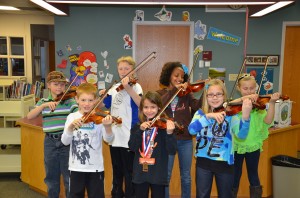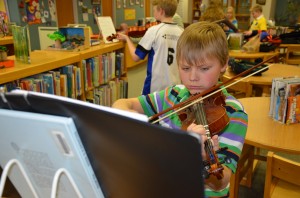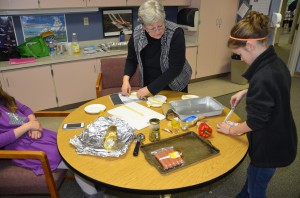Eisenhower Enriches With After School Adventures

Students at Eisenhower Elementary stand poised with violins during the violin Course at Eisenhower Elementary.
(photo by Alyssa Richardson)
During a time where many schools are cutting music and art from course curriculum, one Warsaw elementary school is pushing students toward new and exciting ventures.
Throughout the month of March, staff at Eisenhower Elementary have worked hard to provide students with numerous opportunities to grow on both a scholastic level as well as on a personal one.
After School Adventures, a program that meets after school hours Monday, Tuesday and Thursday, allows children with all interests the chance to learn and expand upon skills they may not be able to focus on in class.
Classes include jazz dance, acting workshops, pottery, world drums, bowling, basketball, violin, cheerleading, cooking, mural painting, hip hop dance, black-light dodgeball, Tae Kwon Do, kinderkrafts and straw weaving.
After School Adventures has been featured at Eisenhower Elementary for the past 17 years. According to Eisenhower Principal Chris Gensinger, the program offers students the ability to tap into gifts and talents that can be expanded upon in their future.
“We are giving our kids to opportunity to find their gifts. If they can experience their talents here on a small scale, it is our hope that they will pursue their newfound gifts through out of school ventures as well.”

StaceyPageOnline.com and Eisenhower Junior Reporter Carson Kerlin practices his violin skills.
(photo by Alyssa Richardson)
One course the school is particularly proud of is the violin course, which has offered several students the opportunity to learn a musical instrument they may not have had access to before.
According to Julie Bruggeman, assistant to Eisenhower Elementary School Principal Chris Gensinger, the violins supplied for students are rented by the school from Quinlan & Fabish located in Fort Wayne. The course is instructed by Stacey Bollman, a private violin instructor that utilizes a group teaching method to help students learn the basics of violin posture alongside their peers.
“Every Spring for the last four or five years, we have been coming together to do a violin class starting with After School adventures and continuing on through the rest of the school year,” said Bollman. “The students have been learning the basics of violin [such as] how to hold their violins correctly, how to hold their bows, how to play Twinkle Twinkle Little Star … just the basics to prepare them to play in an orchestra. I teach mainly by the Suzuki method which teaches children to play together and in groups without reading music at first so they can focus on their posture. They learn how to read music later on.”

Students in Mrs. Mock’s After School Adventure cooking course learn how to create snake dogs.
(photo by Alyssa Richardson)
Bollman, who offers private instruction to her students, isn’t alone in her excitement to work with Eisenhower students after school hours.
Just down the hall students are learning how to prepare tasty, healthy creations with cooking instructor, Mrs. Mock. Students have learned the basics of cooking throughout preparation of several healthy, fun to prepare treats. The class concluded with the creation of “snake dogs,” a hotdog wrapped in a crescent roll made to resemble a snake, and cake baked within waffle cones.
“We’ve done a variety of projects, we started out with very healthy snacks and made them very attractive so that kids would want to eat them and prepare them for their families,” said Mock. “We’ve tried to do about two projects in the evening which has worked out really well. Its been a good experiences, we’ve had a lot of fun.”
In addition to cooking and violins, StaceyPageOnline.com also had the opportunity to watch Eisenhower student’s learn the process of grouting glass to make colorful, custom made frames for their homes. The course, which is instructed by art teacher Mrs. England, has allowed children to work with a variety of glass projects including glass fusion, painting, stepping stones, mosaic frames. England states that the courses allow children to pursue artistic venues that because of cost or messiness, may not have been possible in a classroom setting.
Exploring creativity is not the only thing England believes her student are gaining from the experience. England states that through her research, she discovered that many of the Nobel Prize winners throughout the past 85 years have credited their award to the artistic process they pursued as hobbies. In addition, England hopes that the course helps students realize that careers within the creative field are available.
“The course is definitely enriching. This gives them a real appreciation and opens up their world a little bit and gives them a different perspective. I think that anytime you can learn about the creative process it is definitely to your advantage,” said England. “In the United States there are over 10 million people employed in the creative fields. If we don’t show our kids that, then when they are talking about their dreams it really narrows their vision and view of possibilities. The Nobel Prize winners from the last 85 years were interviewed and they found that in those years, more than half of them gave more credit to their creative hobbies of like painting, poetry or music in problem solving and creating the project that actually won them their noble prize than their actual PhD. I’m all for focusing on science, technology and math, and I think thats important, but I think that the arts offer a lot of things that ISTEP testing and so forth can’t give our kids. I want them to be good problem solvers.”
[youtube http://www.youtube.com/watch?v=tWJV8-Kol-M]